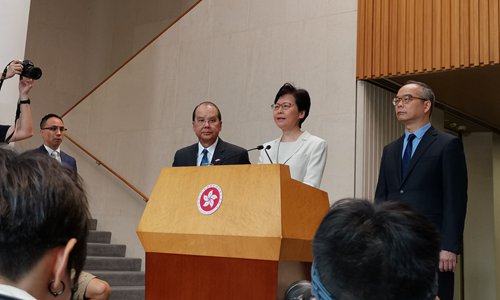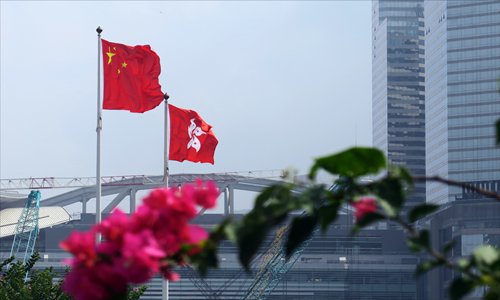HOME >> CHINA
HK chief’s plan lifts spirits
By Wang Cong in Hong Kong and Chen Qingqing in Beijing Source:Global Times Published: 2019/9/5 18:07:04 Last Updated: 2019/9/6 14:02:47
Move injects much-needed optimism, arouses calls to end violence

Hong Kong Chief Executive Carrie Lam Cheng Yuet-ngor speaks at a press conference on Thursday, where she defended her four-action plan as the best way forward and stressed that the Hong Kong Special Administrative Region government cannot and will not meet demands that deviate from the rule of law. Photo: Wang Cong/GT
A comprehensive action plan put forward by Hong Kong Chief Executive Carrie Lam Cheng Yuet-ngor on Wednesday to end unrest has injected much-needed optimism into Hong Kong society, which has been rattled by seemingly endless violence and disruption, and has aroused calls, even from some anti-government people, to begin a dialogue and end violence.
Though still facing criticism from some radical forces that showed no sign of backing down from violence, for many others, Lam's plan marks a critical turning point, as genuine concerns over social and economic issues - from housing to employment - should be separated from irrational, ill-intentioned political goals, and society should unite and reject violence.

Flags of China and China's Hong Kong Special Administrative Region fly in front of the Legislative Council Complex in Hong Kong. Photo: IC
Positive reaction
Lam's plan, including the formal withdrawal of an extradition bill and the creation a platform for dialogue, gained much support from companies to celebrities, to politicians on Thursday.
Following Wednesday's announcement of Lam's plan, major film and entertainment companies and associations, including Hong Kong's entertainment industry in the Chinese mainland, Emperor Entertainment Group and Media Asia Entertainment Group, published a joint statement on Hong Kong newspapers on Thursday, calling on all parties to communicate and to conduct dialogue instead of confrontation while upholding the core values of Hong Kong society.
In the statement, the companies also called on Hong Kong residents to return to rationality and pragmatism and reject violence together.
In advertisements published on several HK newspapers on Thursday, Richard Li Tzar Kai, son of Hong Kong's richest man Li Ka-shing, also called on Hong Kong to stop violence and restore social order through the rule of law and support the government's efforts to conduct a dialogue.
"If you are really for peace, rationality and non-violence, then now is time to separate yourself from the violence," Priscilla Leung Mei-fun, a pro-establishment member of the Hong Kong Legislative Council (LegCo), told the Global Times on Wednesday night. "This is a very important olive branch extended [by the Hong Kong special administrative region government]."
In a sign of changing hearts, Felix Chung Kwok-pan, leader of the Liberal Party in LegCo who usually does not shy away from criticizing the government, also said the withdrawal of the bill is a step forward and "better than nothing," according to some Hong Kong media. He further maintained that protesters, who have vowed "no withdrawal, no retreat," can now retreat.
"The ball is in the anti-government force's court," said Leung, who attended a meeting with Lam on Wednesday before the chief executive announced the plan on Wednesday night. "If they turn a deaf ear and blind eye [to Lam's efforts], they will pay a very heavy price."
Radicals' hysteria
However, some radical elements have shown no sign of retreating despite the government's goodwill gesture. They criticized the chief executive for responding to their demands too late, and for refusing to meet all of their demands. They vowed to continue protesting until all of their demands are met.
Even after Lam announced the plan on a televised speech on Wednesday, some protesters gathered illegally outside the Po Lam subway station in the New Territories, where they vandalized facilities and attacked the supervisor of the station, who required medical attention.
Though protests against the extradition bill began in June, violent protesters have since made several other demands, including those that cross the legal line in Hong Kong and China's sovereignty over the region. Among others, they demand that the government drop charges against those arrested in the protests, dismiss the LegCo and grant universal suffrage.
Speaking to reporters on Thursday morning, Lam defended her plan as the best way forward and made it clear that the HKSAR government cannot and will not meet demands that deviate from the rule of law. "The government cannot do things that are against the rule of law," she said.
"This could be the last concession made by the chief executive and the government. I believe many in the silent majority understand this," Ronny Tong Ka-wah, a Hong Kong Senior Executive Counsel who is considered a member of the centrist camp, told the Global Times on Thursday.
"This is to prove that the opposition has no rationale and no principles, and that if they continue to escalate the riots, the government will enforce the law more strictly," he said.
Tong, who has been calling for a panel to review police practices in response to the protests, said that the anti-government forces were not expected to accept Lam's plan altogether. "But if the majority of ordinary residents supports [the plan], that group of people can be handled," he said.
Lam also vowed again that the Hong Kong government will "strictly enforce the law" to stop violence, if anti-government forces continue to engage in illegal, violent acts.
Lam left Hong Kong on Thursday afternoon, flying to South China's Guangxi Zhuang Autonomous Region to attend the Pan-Pearl River Delta Regional Cooperation Chief Executive Joint Conference, seeking closer business ties between Hong Kong and the mainland.
This is the first time Lam left Hong Kong during the months-long protests, which reflects her confidence in Hong Kong's return to stability. Attending the conference will help Hong Kong tap into more opportunities in regional development and to demonstrate the city's driving role, observers said.
RELATED ARTICLES:
Posted in: HK/MACAO/TAIWAN